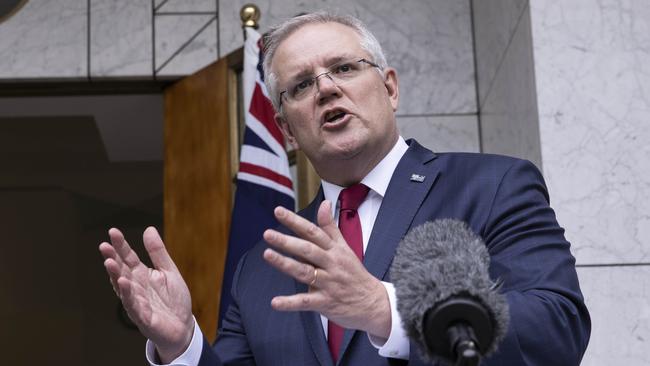Terry McCrann: Why it’s time to talk about superannuation
Many Australians have cut their superannuation balance down to zero and will essentially never get anywhere near a balance sufficient to replace the pension. Now the Prime Minister is hinting at stopping contributions at 9.5 per cent, so it’s time for us to have a real discussion about our super system, writes Terry McCrann.

Terry McCrann
Don't miss out on the headlines from Terry McCrann. Followed categories will be added to My News.
The Prime Minister has opened the door to ending Paul Keating’s compulsory superannuation that has built up balances of $3 trillion and is supposed to shift most of us away — over decades — from relying on the age pension.
Now Scott Morrison has not said anything remotely like this; indeed I doubt that he has the slightest idea that could be such an outcome of his musings, but that is nevertheless precisely what he has done.
His latest statement was to “muse” that perhaps the government would postpone the compulsory increase in super contributions from the current 9.5 per cent of a wage or salary to 12 per cent.
This followed the statement on Friday by Reserve Bank Governor Philip Lowe that raising the super guarantee from the current 9.5 per cent would “reduce wages, cut consumer spending and could ultimately cost jobs”.
Lowe’s statement — and indeed the PM’s observation — opened yet another door: who would/should get the 2.5 per cent of wages if the super guarantee was kept at its current 9.5 per cent? The employer or the employee? We’ll come back to that.
First, if the contribution is kept at 9.5 per cent — whether just while we ride through the virus crises or more permanently — the cut would combine with the $40bn that people have taken out of super under the “virus financial stress” dispensation to significantly and permanently prevent some millions of workers being able to build up sufficient balances to fund their own retirement.
Even though the $40bn might not seem much of a slice of the $3 trillion, its withdrawal will make it much harder and indeed impossible for those millions of especially lower-paid and part-time working Australians to build up much of a super balance by retirement.
Even if they didn’t aim to just cash in what they had built up to take a long holiday in Europe or Asia — assuming that by 2040 and years later we will be able to — and then on return to Australia go on the pension, they would be at least part-time and probably full-time pensioners anyway.
This is also even the likely case before you factor in the increasing prospect that the sort of high single-digit returns that super balances have been racking up year after year after year, might well be much lower in a more challenged future.
It’s all in the magic of compounding interest or returns — like you see projected in those industry super ads.
You put in a dollar upfront and watch it grow over 10, 20 and 50 years.
You put in $10 and watch it really sprout.

Many Australians have cut their balances all the way to zero or all-but zero. They have to start again, but with only say, 20 or 30 years now left for the compound magic to work. They will essentially never get anywhere near a balance sufficient to replace the pension.
Stopping contributions at 9.5 per cent makes that even more certain. It would also expand the universe of people who would not compound-grow their balances enough.
Do we really want to be giving out the tens of billions of tax benefits each year — to say nothing of the tens of billions of dollars that are mandatorily fed into the bank balances of the financial services industry through the fees — just to fund final flings of some description on retirement? With the taxpayer cost of the pension still to be paid?
That leads to a further question.
What’s happened — the withdrawals and possibly now stopping contributions at 9.5 per cent — would even further weigh the benefit of those tax concessions to higher income earners.
Only the compulsory contributions would be capped at 9.5 per cent; people could still make additional voluntary contributions; and you don’t have to think too hard about who they would most likely be.
A further point; those higher income earners with bigger balances are also more able to cut the fees that disappear into the rapacious maw of the financial services industry compared with lower and middle income earners.
Now it’s worth nothing that Lowe was not exactly saying that the extra 2.5 per cent should be paid as higher wages and salaries.
That might seem to be the best way to see it flow into consumer spending and so job creation.
But it would also tend to drive already stressed businesses broke and so precisely undermine jobs and, wages and spending growth.
Rather than mandate that the 2.5 per cent must be paid to employees or must be left with the employer, it could more sensibly be available for negotiation between employer and employee, whether in awards or contracts.
Wherever any of this leads in the short-term frenzies of the virus, the recession and the politics; we do need to “start a conversation”on the 30-year old compulsory super system.
Originally published as Terry McCrann: Why it’s time to talk about superannuation
